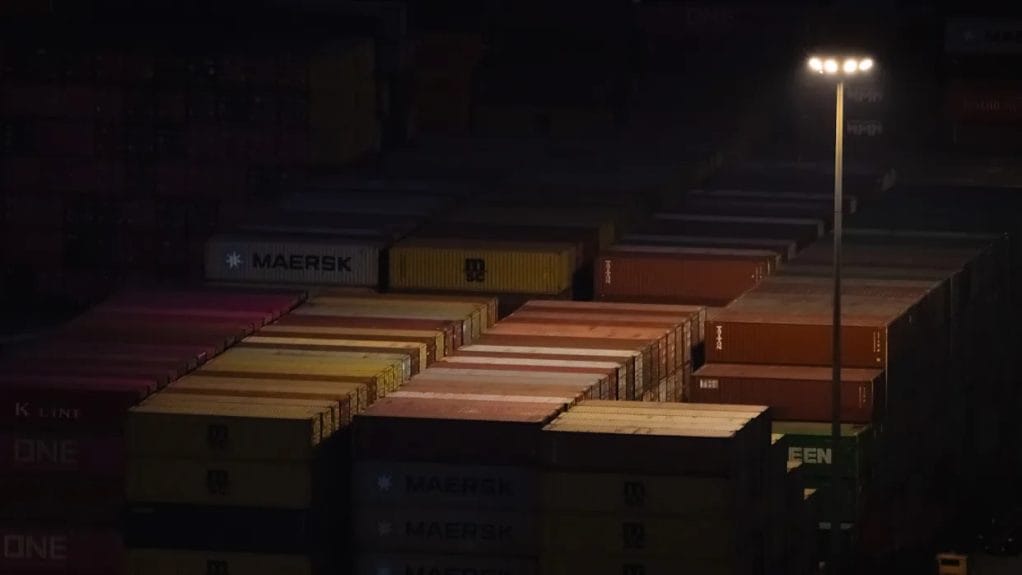The Atlantic//What If China Wins the Trade War?
By Rogé Karma
If Donald Trump were trying to lose his trade war with China, it’s hard to see what he would be doing differently. The president’s gambit is likely to strengthen China’s geopolitical position, embolden Beijing militarily, and diminish both the United States’ global standing and its economy.
Earlier this month, Trump increased tariffs on all goods from China to 145 percent. China, in turn, responded with 125 percent tariffs on American goods, plus more targeted measures. This is a classic trade war: two countries engaged in a tit-for-tat escalation of trade barriers, each with the goal of forcing the other country to back down and, at least in theory, agree to certain concessions.

The Trump administration believes that it has the upper hand in this fight. “We export one-fifth to them of what they export to us,” Treasury Secretary Scott Bessent recently remarked, “so that is a losing hand for them.” That view has things backwards. The fact that the American economy is hooked on Chinese goods is a massive weakness for the U.S., not an advantage. For many categories of goods, China is not only America’s top supplier but also the world’s dominant supplier, meaning that the U.S. can’t simply get them from other countries. According to data gathered by Jason Miller, a professor at Michigan State University who specializes in supply-chain management, China produces more than 70 percent of the world’s lithium-ion batteries, air conditioners, and cookware; more than 80 percent of the world’s smartphones, kitchen appliances, and toys; and about 90 percent of the world’s solar panels and processed rare earth minerals, the latter of which are crucial inputs to cars, phones, and several key military technologies.
Pivoting to producing these goods at home would take years, if not decades: It would involve forming new companies, building new factories, creating supply chains from scratch, and training fleets of workers. For it to happen at all, companies would have to be confident that the tariffs would be in place for the long term. China, meanwhile, is only heavily dependent on the U.S. for a small fraction of its imports, and most of those items, such as soybeans and sorghum, can be imported from elsewhere.
Chinese businesses will be hurt by losing access to the American market, but that is an easier problem to solve. China can redirect some of its exports to countries in Europe and East Asia, whose citizens also need phones, toys, and toasters. Beijing could also give money to its own citizens to create more demand for its products at home and provide subsidies to its businesses to help them remain solvent. This asymmetry gives China what the economist Adam Posen calls “escalation dominance”: the ability to inflict disproportionate harm on its economic enemy.
China’s advantage has been bolstered by years of meticulous preparation. Multiple China watchers told me that Trump’s 2018 trade war—in which, at its height, the U.S. imposed an average tariff of about 20 percent on Chinese goods—convinced Beijing that it had to be ready to engage in economic combat at a moment’s notice. Since then, China has invested heavily in such industries as energy, agriculture, and semiconductor production to reduce its dependence on American imports, while pursuing a concerted strategy to consume more goods at home and find new non-U.S. export markets. The goal of these efforts, in the words of Chinese President Xi Jinping, is to “ensure the normal operation of the national economy under extreme circumstances.”
Beijing has also built an arsenal of offensive economic weapons. Already, China has responded to Trump’s trade war by banning exports of several rare earth minerals, a move intended to produce shortages of both major consumer goods (such as cars and phones) and military equipment (such as submarines and fighter jets); launching antitrust investigations into DuPont and Google; and halting all business with Boeing, America’s top aircraft manufacturer. If the situation escalates further, Beijing might block certain high-profile U.S. companies, such as Apple and Tesla, from doing any business in China at all. Then there’s the nuclear option: China, the second-largest foreign holder of U.S. debt, could quickly sell off a sizable chunk of its $760 billion in U.S. Treasuries, a move that would send interest rates soaring, spook investors, and perhaps even trigger a financial crisis.
“China is ready for this fight,” Yeling Tan, a public-policy professor at Oxford University who focuses on Chinese political economy, told me. “It has been busy preparing for an entrenched economic conflict with the U.S. for a long time.”
Despite all of these challenges, the experts I spoke with agreed that the United States could still defeat China in a trade war if it does everything right. The problem is that the Trump administration is doing everything wrong.
China has some advantages in a head-to-head economic matchup with the U.S., but America has a secret weapon: its friends. If the United States were to join forces with its traditional allies in Europe, North America, and East Asia to collectively cut off China while deepening trade relations with one another, then this bloc could inflict much more damage on China (which would have fewer places to sell its goods) while minimizing its own pain (Chinese imports could be more easily and quickly replaced). This would require considerable planning and preparation. The U.S. and its allies would have to embark on a colossal coordinated economic mobilization to quickly develop new industries, develop a monitoring system for global supply chains staffed with an army of well-trained bureaucrats to prevent cheating, roll out the trade restrictions on a gradual timeline to give businesses and investors time to adjust, and establish clear conditions by which they would be willing to end the trade war. That’s a partial list.
Trump has, of course, done nearly the opposite of everything I just described. Instead of spending years, or even months, investing in American industry, Trump is angling to get rid of the major investments in semiconductor and clean-energy manufacturing implemented under the Biden administration. Instead of engaging in a gradual tariff rollout, the administration jacked up tariffs to 145 percent over the course of a few weeks. Instead of providing businesses and investors with clear guidance, the administration has changed its story by the day, if not the hour. And instead of building a coalition of allies, Trump has spent the past few months threatening, feuding with, and tariffing them. Even if the U.S. were to suddenly change course and try to build an anti-China coalition, a prospect recently floated by Bessent, it is likely too late. What country would sign up for economic hardship for the sake of an “ally” that has not only treated it poorly but has also repeatedly demonstrated that it can’t be trusted to honor any bargain?
The outcome of a trade war is determined not only by the pain inflicted but also by each country’s tolerance for that pain. On that front, the United States has one thing going for it: Voters generally support taking on China. One study of Trump’s first-term trade war with China found that voters in places that were most exposed to the effects of import tariffs became more likely to vote for Trump in 2020. A CBS poll in February found that 56 percent of voters supported placing new tariffs on China, even as majorities opposed tariffs on Mexico, Canada, and Europe.
The question is whether voters’ appetite for punishing China will outweigh the sting of chronic shortages and higher prices. Trump’s first-term tariffs against China were relatively modest, so they didn’t lead to big price increases. This time around, sticker shock will be impossible to ignore. Voters consistently cited inflation as the most important issue in the 2024 election. How will they react when the politician who promised lower prices instead presides over the opposite? According to several recent polls, most voters had soured on Trump’s tariffs before they had even gone into effect. Making matters worse, the combination of Chinese retaliation against American exporters and tariff-induced uncertainty facing businesses may also lead to a broader economic slowdown. Many economists warn of a return to 1970s-style stagflation: the toxic combination of soaring prices and rising unemployment.
Even Trump might lack the stubbornness to persist through that level of economic distress. He has already broken the cardinal rule of trade wars—never tell your opponent where your breaking point is—by “pausing” his global reciprocal tariff policy in the face of chaos in the bond market. Even if Trump were willing to withstand the political pressure for longer this time, he’s unlikely to outlast Xi Jinping, who faces neither term limits nor elections. “Beijing is very good at waiting,” Dan Wang, a research fellow at the Hoover Institution, told me. “They might not be able to last forever, but they can certainly last longer than a single election cycle.”
In all likelihood, then, Trump will eventually be forced to back down. This might take the form of a deal in which China agrees to largely symbolic concessions that allow Trump to save face. (This is how the first Trump-China trade war de-escalated.) But China might not be so quick to offer Trump an easy way out. In that case, surrender might instead take the form of a series of tariff carve-outs to different industries, to the point where the exceptions exceed the actual tariffs. In either case, the result would be the same: The U.S. would have inflicted considerable economic pain on itself without getting much in return.
China, however, would have gotten quite a bit. Last week, the Spanish government declared its intent to strengthen relations with China. The European Union recently agreed to restart talks to settle a trade dispute over Chinese EV imports and will be sending a delegation to Beijing in July for a summit with Xi. South Korea and Japan recently revealed that they will be reopening negotiations over a long-stalled free-trade agreement with China. This week alone, Vietnam signed dozens of new economic deals with China, and Xi is currently on a tour of Southeast Asia to solidify relations with other countries in the region.
A Chinese trade-war victory would also embolden Beijing in noneconomic matters. China hawks have long insisted that one of the most important deterrents in preventing Chinese aggression, such as invading Taiwan, is the threat of an economic blockade. But if Beijing demonstrates that it can withstand such a barrage, that threat will lose credibility. China will become more likely to take aggressive actions, and American politicians will lose their appetite for using economic coercion to stop it. In that sense, a failed trade war could make the chances of an actual war more likely. You might even say that Trump’s tariff policy sounds a bit like the “disastrous” American military adventures that he has so often criticized. Only this time, he’s the one leading the charge.
###
Article originally published at The Atlantic


